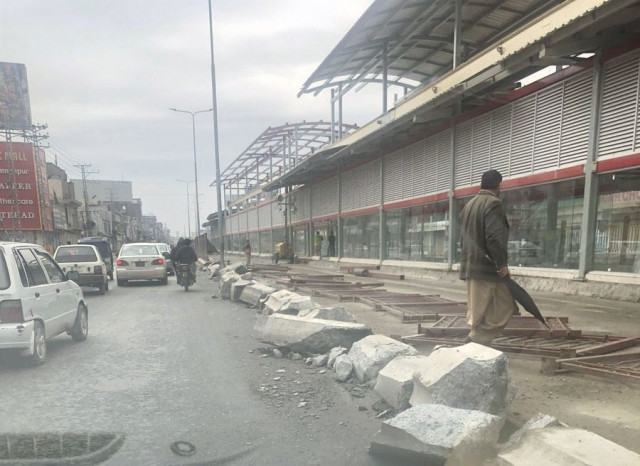BRT to enjoy a monopoly on route
As many as 400 vehicle owners to be affected by the project which will be completed next year

Peshawar BRT. PHOTO: FILE
Moreover, the provincial government also intends to revive the circular railway project for five districts of the province by including it in the multi-billion dollar China-Pakistan Economic Corridor (CPEC).
This was stated by Khyber-Pakhtunkhwa (K-P) Information Minister Shaukat Yousafzai while addressing a news conference in Peshawar to present a performance report on the provincial transport department for the past year. He was accompanied by the K-P transport secretary.
During the briefing, Yousafzai said that around 87 per cent of work on the Bus Rapid Transit (BRT) project in Peshawar has been completed while around 85 per cent of the stipulated funds have been spent on the project. Of the 32 stations for the transit project, 30 have been built. Once complete, control of the project will shift from the executing agency Peshawar Development Authority (PDA) to the provincial transport department.
Defending the rising cost of the project, which has undergone multiple alterations and delays, the information minister said that the initial estimates in the project concept-I of BRT were Rs56.8 billion. However, the Executive Committee of the National Economic Council (ECNEC) under the previous Pakistan Muslim League-Nawaz (PML-N) government had approved the project for a revised cost of Rs49.34 billion.
Later, owing to alterations in designs, the cost of the project rose to Rs66.43 billion and a revised PC-I was approved by the government. Of this, the provincial government will pay around Rs13.116 billion while the Asian Development Bank and France will pay the remaining Rs53.211 billion.
Explaining the cost increase, Yousafzai said that the project now includes an additional 68 kilometres of feeder roads on both sides of the corridor along with a 13-kilometre-long elevated track, three kilometre-long underpasses. Moreover, the cost of the project increased by Rs3 billion because it was extended to connect the Karkhanu Market.
However, the information minister contended the increasing cost was offset by the money ‘gained’ by the government owing to the sharp fall the rupee had witnessed against the dollar during the calendar year.
He further argued that the Peshawar BRT project is still ‘cheaper’ than the one built by the previous PML-N government in Lahore. He contended that all the buses plying in the Lahore metro system have been rented while the K-P government had bought all the 220 buses which will ply in the project.
Of these buses, Yousafzai said 120 have already arrived in Peshawar.
To ensure the commercial viability of the project, he said that the provincial government will not offer any subsidies. Moreover, the BRT will be the sole public transport service to operate on its route with all old vehicle permits for the route cancelled. Owners of some 400 vehicles which ply on this route will then either have the option of operating on a different route or they could sell it out to the BRT for scrap.
Earlier, Yousafzai said that K-P Governor Shah Farman and Chief Minister Mahmood Khan met with Prime Minister Imran Khan to consult him about issues about the expansion of the provincial cabinet by including elected members from the erstwhile federally administered tribal areas in it. Moreover, the prime minister was given an update about the BRT project and that it is now expected to be completed by next year.
He further said that the provincial transport department has generated revenues of more than Rs2 billion over the past three years. Further, he said that the department has slashed the time it took to issue a driving licence, route permit, fitness certificate for vehicles within 45 days instead of 180 days previously.
Moreover, applicants can track progress through an online system.
The information minister further said that the department has issued special permits and routes to public transport operating in designated tourist areas. In this regard, he said that they were working on regulating Qingqui rickshaws while they were in the process of developing legislation is to regulate ride-hailing services such as Careem and Uber, and the rent-a-car business.
The provincial minister said that the circular rail project has also been included in the CPEC project, while one-window facilitation centres are being set up in the merged areas where facilities such as issuing permits, licenses, etc will be provided under a single roof.
The provincial minister said that mobile vehicle fitness stations are being set up in six districts including Peshawar, Malakand, Abbottabad, Mardan, Kohat, and Dera Ismail Khan. Mobile weigh stations are also being set up in these districts to check loads carried by trucks.
Published in The Express Tribune, November 28th, 2019.













COMMENTS
Comments are moderated and generally will be posted if they are on-topic and not abusive.
For more information, please see our Comments FAQ